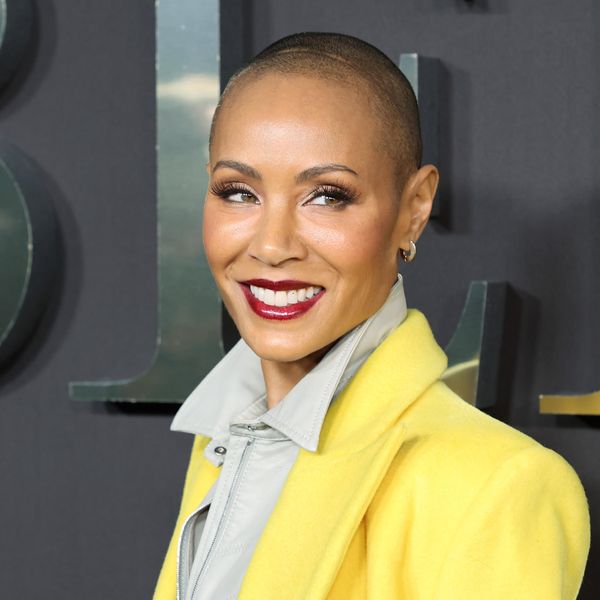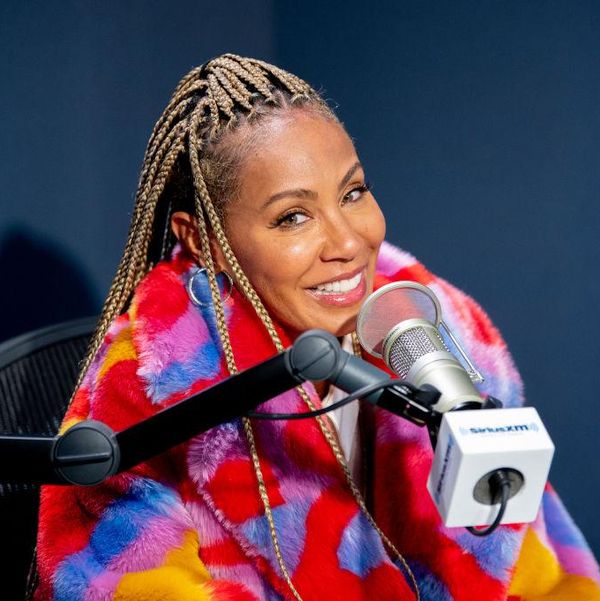Jada & Willow Smith Open Up About Sexuality: "I've Had Times I've Been Infatuated With A Woman"

Jada Pinkett Smith and Willow Smith are opening up in a whole new way, ladies. Things got real candid about sexuality in the latest episode of Red Table Talk, and I'm just here for every second.
It all started ahead of their interview with Niecy Nash, who married Jessica Betts last year. For a quick background, the two basically collectively broke the internet and confused us all in a move that made us gather our pearls, say 'OK dennnn', and proceed with celebrating their union. Jada and Willow touched on the subject and took a quick turn when the mother/daughter duo discussed their own feelings of attraction towards women.
Jada began:
"I love being amongst women, but I never could connect to women romantically. But that's not to say that it couldn't be. You just never know."
She then said that she could totally imagine Willow falling in love with a woman, to which Willow replied:
"I've had my fair share of swooning and feeling, 'She's so beautiful, she's so talented.'"
Ultimately, Jada agreed with the mult-hyphenate, and said:
"I've had two times [where] I've been infatuated with a woman. I've swooned two times, early, early on. Like [age] 20."
Willow, who is 20 herself, then quipped:
"I haven't been in love with a woman just yet, but I definitely feel like it could happen. Because I've had very strong feelings for women before."
Laaaaawd, I could not imagine having this conversation with my mother, but healthy communication is what we love!
Eventually, the two brought up a prior conversation where Willow mentioned to her mom that if her marriage to Will didn't work out, Willow could see her mother having a relationship with another woman.
Well, OK dennnn.
Granted, this isn't the first time these two have opened up about their sexuality on the show. Willow touched on polyamory and loving both men and women previously in 2019 when she said:
"I love men and women equally, and so I would definitely want one man, one woman. I feel like I could be polyfidelitous with those two people. I'm not the kind of person that is constantly looking for new sexual experiences. I focus a lot on the emotional connection and I feel like if I were to find two people of different genders that I really connected with and we had a romantic and sexual connection, I don't feel like I would feel the need to try to go find more."
And of course, Jada's relationship status has been discussed on the Red Table many times, thus bringing forward the complex conversation of "entanglements".
And we all know that one got a little messy, but the pair were able to create a very public open dialogue, and move on in their marriage, as so many--without the world watching--have to put their big girl and boy panties on, and do.
Watch the full episode of Jada and Willow speaking on their attraction to women below:
Are you a member of our insiders squad? Join us in the xoTribe Members Community today!
Featured image by Featureflash Photo Agency / Shutterstock.com
Charmin Michelle is a southern native and creative spirit who works as a content marketer and events manager in Chicago. She enjoys traveling, #SummertimeChi, and the journey of mastering womanhood. Connect with her on Instagram @charminmichelle.
Exclusive: Melanie Fiona On Making High-Vibrational Music & Saying Yes To Partnership
Melanie Fiona is back! After taking a little more than a decade-long hiatus, she has officially made her return to music and blessed us with two singles, “Say Yes” and “I Choose You.” While both singles are very different from each other, they both reflect who she is today and the type of music she wants to make. In our conversation, the mom of two expressed what she learned during her time away.
“It's interesting, even when I said it is like coming back, I don't ever feel like I really left because I was always still performing. I've still been public. It's not like I went into being this recluse person or version of myself, but the thing that I really learned in this process is that I think things take time,” Melanie says in a xoNecole exclusive.
“I think often we're so caught up in it, being on the timing of demand or popularity, or, like, striking while the iron is hot and the thing that I've learned is that everything is on God's time. That's it. Every time I thought I would have been ready, or, like, things were taking too long, I had to reship some things, personally, professionally, in my life. I also gave myself permission to make a living, not just make a living, but make a life for myself.”
Making a life for herself included getting married to Grammy-nominated songwriter Jared Cotter, starting a family, and embracing new landscapes, such as podcasting as a co-host of The Mama’s Den podcast. She also began doing more spiritual work and self-care practices like meditation, sound healing, Reiki, acupuncture, and boundary setting, which allowed her to get in touch with her inner voice.
“I wasn't putting out music, and I wasn't experiencing a number one record, but I was being a number one mom,” she says.
“I was experiencing things that were allowing me to heal and get in touch with myself so that I could make new music from a space of joy and freedom, and excitement again because I definitely feel like I did lose some excitement because of just politics and industry and what it can do to your mental health and even your physical health. So giving myself the space to really just say, ‘Hey, it's okay. Everything's right on time.’”
The joy and excitement are felt in one of two new singles, “I Choose You,” which is more of a lovers rock vibe, a tribute to Melanie’s Caribbean roots. While the Grammy award-winner is known for ballads like “It Kills Me” and “Fool For You,” she is becoming more intentional about the music she makes, calling it high-vibrational music. She says her music is a “reflection of my life,” as it captures every facet, from hanging out with friends to riding around in her car.
“Say Yes” has the classic R&B vibe Melanie is known for. However, both songs are inspired by her relationship. Melanie and Jared got married in December 2020, and the Toronto-bred artist dished on their relationship. Fun fact: he is featured in the “Say Yes” music video.
“When we first started dating, I had come into that relationship post a lot of self-work. I had gotten out of a long-term relationship, I had a year and a half to date and be by myself and do a lot of work on myself alone. And when we met, I remember feeling like this has to be my person because I feel it,” she says.
“And so when we went into that relationship, and we started dating, I was very clear. I was like, I know what I want. I'm very clear on what I need, and I'm not going to withhold my truth about myself in this process because of pride or fear of rejection. I know you love me, but I'm coming with my heart in my hand to let you know that if we're gonna get there, we have to put fear aside and say yes. So that was kind of like my open letter to him, which is why the video is us having a conversation.”
Melanie also shares that saying yes to her partner has empowered her in many ways, including motherhood and showing up for herself. Her new EP, also titled Say Yes, will be available at the top of 2025.
Check out the full interview below.
Let’s make things inbox official! Sign up for the xoNecole newsletter for love, wellness, career, and exclusive content delivered straight to your inbox.
Feature image by Franco Zulueta
Entertaining Like Ayesha Curry: Expert Advice For Holidays Done Right
Be prepared to wow the crowd.
It’s officially the holiday season, which means parties and gatherings galore. Between Friendsgiving, Christmas, and New Year's Eve celebrations, many of us are preparing to host loved ones in our homes one or two times between now and the end of the year. No matter the occasion or season, hosting for family and friends is a labor of love. But we can also agree that entertaining can be overwhelming, especially for first-time hosts.
As a seasoned host and entertainer, Ayesha Curry knows something about creating a memorable event for loved ones. Whether preparing for an intimate dinner with your immediate family or hosting a larger crowd, your guests will think you are a pro this holiday season with her tips on everything from welcoming guests to setting a beautiful table.
Q: What is your top tip for hosting?
Ayesha Curry:Part of being a great host is spending time with your guests, which means you can’t be stuck in the kitchen. Prep is key! I usually serve wine with the meal, but a cocktail or mocktail is a great way to greet guests. I prep the garnish the night before and batch the drink just before guests arrive. When the party begins, I pull everything out of the fridge and am ready to serve.
Writer Note: If you would like to offer non-alcoholic beverages for your sober or sober-curious guests, I love Saint Viviana Cab. It maintains full-body cabernet and flavor; no one will ever guess it’s alcohol-free. You can easily create a signature mocktail using Bittermilk’s Smoked Honey Whiskey Sour mix.
Q: Do you suggest any prep for serving or cooking?
AC:I lay out all my serving dishes and utensils the night before with little post-it notes saying what goes where. That way, I’m not digging around for anything. For more elaborate menus, I lay out quarter sheet pans and label them with tape according to the dish. I prep and measure everything for each recipe and then load each sheet pan with everything needed to make the dish. I wrap each tray in saran or foil, stack them, and place them in the fridge. Pull out the sheet pan you need when cooking, and everything is ready. It’s something I learned at the restaurant that saves so much time.
Q: What’s one item that should always be on a dinner party menu?
AC: Bread or roll with butter is excellent for holding guests over if the kitchen is delayed.
Q: What’s one non-menu item you should always have on hand?
AC: For a non-menu item, wine!
Q: How do you decide on a theme or menu for a gathering?
AC: It all starts with the occasion and the guest list. If it’s a group that doesn’t know each other very well, I may get more elaborate with the theme to help break the ice. For a group of friends or family who don’t get to see each other very often, I usually keep it simple so the evening can be all about catching up. A great playlist, good wine, and a family-style menu are all you need.
Q: Should attendees be expected to bring a gift?
AC: If I’m hosting, I’m not expecting gifts. The gift is taking time to come over and enjoy a meal with me! But bringing something to enjoy at the gathering, like a bottle of wine, is always appreciated.
Q: What are three affordable gifts that guests can give a host?
AC:A bag of excellent coffee is a beautiful gift for a host. Sweet July’s House Blend Coffee is sourced from all-female co-ops, so it’s a gift I love to give to the women in my life. Whether it’s being served after dinner or just for the host to enjoy on their own, you can’t go wrong with a bag of high-end coffee.
Fresh flowers are great if you have a host who likes total control over the food and beverage menu. Go for something neutral in color that can work with any décor.
The Sweet July Olive Oil and Balsamic Vinegar set is my go-to host gift. Bottled in Napa, it’s a gift any foodie will appreciate - and use!
Q: What are some creative tablescape or decor ideas that you love?
AC: I like to keep my dinnerware neutral and classic (like this ceramic collection in nutmeg) and infuse color and texture through linens. For centerpieces, I want to use what I have in my yard. If it’s summer, it might be flowers or greenery, but interesting branches can also look architectural in tall, clear vases next to tapered candles in the colder months. There’s no need to spend a ton of money on flowers.
With Ayesha’s tips, you can create a holiday gathering that your family and friends will cherish forever.
Let’s make things inbox official! Sign up for the xoNecole newsletter for love, wellness, career, and exclusive content delivered straight to your inbox.
Featured image by Getty Images









